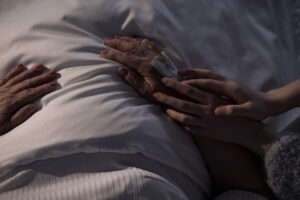Hygiene “is any practice or activity that you do to keep things healthy and clean” [Source: Centers for Disease Control and Prevention (CDC)]. It is essential for everyone to practice good hygiene, whether they do it for themselves or have someone assisting them, as it helps to prevent many diseases and conditions from developing or control those a person might have already come down with. Good hygiene can generally be achieved by brushing your teeth and washing your body with soap and clean water, although there are many other ways to maintain a positive hygiene level.

When an individual fails to maintain their hygiene, especially those whose immune systems aren’t as strong as they once were (i.e. older adults), they become susceptible to developing a hygiene-related disease. This might include dental caries (tooth decay), scabies, ringworm, etc. While most of us are in control of our own hygiene levels, many are not. Take for instance the older adults living in a nursing home. Many of these aging individuals are no longer able to take care of themselves in the manner they once could and often require assistance with some of the simplest tasks. For example, there many people living in a nursing home right now that are immobile and unable to get up to brush their teeth or use the restroom.
So, what happens to a person whose immune system that can be easily compromised isn’t provided with the help they need from nursing home staff to maintain good hygiene?
As we mentioned, they could develop a hygiene-related disease which could result in them suffering from additional medical conditions. For instance, if a resident isn’t bathed regularly, they could develop an odor and they may even begin to see rashes forming on their skin. Nursing home residents who aren’t bathed often may also suffer from infections which will only get worse with time when not properly tended to.
The CDC also says that “good hygiene is important to prevent and control scabies.” Scabies is an infestation of the skin by the human itch mite (Sarcoptes scaniei var. hominis). The microscopic scabies mite burrows into the upper layer of the skin where it lives and lays its eggs.” The CDC says that “scabies can spread rapidly under crowded conditions where close body and skin contact is frequent. Institutions such as nursing homes, extended-care facilities, and prisons are often sites of scabies outbreaks.”
When a nursing home resident becomes infested with scabies, they will likely begin to experience the following symptoms:
- Intense itching
- Pimple-like rash which could potentially become infected by bacteria
Now, because scabies can spread, it is important that nursing home staff address the problem right away and take the necessary measures to keep it under control. For instance, the CDC says that “bedding, clothing, and towels used by infested persons or their close contacts anytime during the three days before treatment should be decontaminated by washing in hot water and drying in a hot dryer, by clean-drying, or by sealing it in a plastic bag for at least seven hours.” If a nursing home staff member fails to take these measures, it could result in a scabies outbreak which means more residents could become infested with the mites.
Is your loved one showing signs of poor hygiene? Are they reliant on nursing home staff to help them with things like brushing their teeth, bathing, dressing, etc.?
If so, it is imperative that you bring this to the attention of the nursing home staff member who is responsible for caring for your loved one. You can also notify the head nurse or the facility administrator if you feel your concerns aren’t being addressed promptly. While tending to nursing home residents can be challenging for workers, never should a resident’s hygiene be ignored. Residents should be receiving clean bedding, clothing, etc. and should be bathed, have their teeth brushed, and their hair combed frequently.
Is it considered neglect if nursing home staff doesn’t help my loved one maintain good hygiene levels?
If nursing home staff members aren’t tending to your loved one and providing him or her with the assistance needed to help them maintain good hygiene, then one or more staff members might be neglecting them. Sometimes, residents are left unbathed for days or are forced to sit and sleep in dirty clothing/bedding. If you suspect your loved is being neglected, we urge you to contact Dinizulu Law Group, Ltd. to speak with one of our Chicago, IL nursing home abuse lawyers for legal help. Our skilled attorneys can investigate into the matter and determine if your claims are valid. In the event they are, we can help relocate your relative should you wish to do so and even assist you with taking legal action against the facility for the suffering your loved one has been subjected to.
If you would like to discuss the issue with one of our nursing home abuse attorneys in Chicago, IL now, you can contact us at 1-312-384-1920.
You can contact Dinizulu Law Group, Ltd. at:
221 North La Salle Drive, Suite 1100
Chicago, IL 60601
Phone: 1-312-384-1920
Website: www.dinizululawgroup.com


